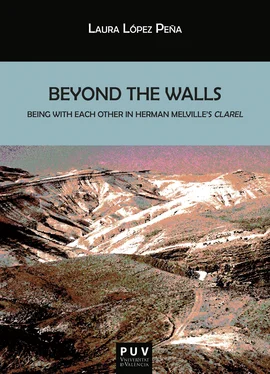Laura López Peña - Beyond the Walls.
Здесь есть возможность читать онлайн «Laura López Peña - Beyond the Walls.» — ознакомительный отрывок электронной книги совершенно бесплатно, а после прочтения отрывка купить полную версию. В некоторых случаях можно слушать аудио, скачать через торрент в формате fb2 и присутствует краткое содержание. Жанр: unrecognised, на английском языке. Описание произведения, (предисловие) а так же отзывы посетителей доступны на портале библиотеки ЛибКат.
- Название:Beyond the Walls.
- Автор:
- Жанр:
- Год:неизвестен
- ISBN:нет данных
- Рейтинг книги:3 / 5. Голосов: 1
-
Избранное:Добавить в избранное
- Отзывы:
-
Ваша оценка:
- 60
- 1
- 2
- 3
- 4
- 5
Beyond the Walls.: краткое содержание, описание и аннотация
Предлагаем к чтению аннотацию, описание, краткое содержание или предисловие (зависит от того, что написал сам автор книги «Beyond the Walls.»). Если вы не нашли необходимую информацию о книге — напишите в комментариях, мы постараемся отыскать её.
Beyond the Walls. — читать онлайн ознакомительный отрывок
Ниже представлен текст книги, разбитый по страницам. Система сохранения места последней прочитанной страницы, позволяет с удобством читать онлайн бесплатно книгу «Beyond the Walls.», без необходимости каждый раз заново искать на чём Вы остановились. Поставьте закладку, и сможете в любой момент перейти на страницу, на которой закончили чтение.
Интервал:
Закладка:
Justice derives not from the state, which must nonetheless institute and maintain justice, but from the transcendence of the other person, the “widow, the orphan, the stranger”. It is in relation to this irreducible and immediate responsibility that, in the name of justice, culture, history, organized religion, the state, science, and philosophy take on their ultimate sense and have their ultimate justifications. The entire realm of the universal, in all its particular historically determined manifestations, emerges from and is guided by the imperatives of morality and is subject to moral judgment. (Cohen “Introduction” xxvii-xxviii)
A disciple of Levinas’s arguments on interhuman responsibility and of Arendt’s notion of cohabitation, Judith Butler has defended a conception of global ethics that is also relevant to theoretically articulate Melville’s project. Butler places the possibility of global bonds in the recognition of vulnerability and precarity as universal characteristics, as well as in the awareness of the fact that human beings are all “unchosen together”:
For whoever “we” are, we are also those who were never chosen, who emerge on this earth without everyone’s consent and who belong, from the start, to a wider population and a sustainable earth. And this condition, paradoxically, yields the radical potential for new modes of sociality and politics beyond the avid and wretched bonds formed through settler colonialism and expulsion. We are all, in this sense, the unchosen, but we are nevertheless unchosen together. (“Precarious” 23-24)
Through the recognition of this bond, which exposes not only our common humanity but also our common vulnerability, ego-centered thinking is transcended in favor of the interhuman, and this may trigger the “radical potential for [the] new modes of sociality and politics” indicated by Butler. Butler emphasizes Arendt’s premise that no human being has the right to decide with whom to cohabit the earth, because such a choice would directly attempt against the very plurality on which the earth itself and the very existence of each human being are directly dependent. Following Arendt, thus, Butler notes that human existence—as well as political life—depends on the earth’s heterogeneity and plurality, and that, therefore, there is no individuality outside plurality in the same way that no plurality can replace any individuality (17). In fact, Butler states that belonging “must actually no know [sic] bounds and exceed every particular nationalist and communitarian limit” (20). This leads her to turn away from any form of citizenship constituted by particular racial, religious, and national(ist) identitarian criteria, often generating displaced subjects who are made to remain in a limbo-like space between strict systems of classification, or who may even be unclassifiable at all by these criteria. Butler’s ethical views are universalist in scope, as she criticizes nationalism for concealing the fact that our political existence depends on unchosen cohabitation of the earth with other human beings on whom the very preservation of our lives relies. This unchosen cohabitation and inevitable vulnerability of our existences constitute the basis of Butler’s universalist ethics. Butler vindicates the need to develop institutions that preserve human life without giving preference to the worth of some lives over others. According to the thinker, vulnerability is the common condition of human beings (and of other living beings), and this vulnerability both affirms and determines our existence as relational and dependent on others. This conception of human existence resonates with Agamben’s adjacency, Buber’s intersubjectivity, Nancy’s being-with, and Derrida’s politics of friendship. Their “unwilled adjacency” (“Precarious” 5) inevitably connects human beings in our, also inevitably, precarious human condition; our lives mutually intertwined, not only with those who are near us but also with those in the distance. This implies that our inter-human responsibility and derived ethical obligations are global in character, and that these moral obligations expand beyond, and disrupt, the boundaries imposed by egocentric behaviors and community-based forms of belonging:
If I am only bound to those who are close to me, already familiar, then my ethics are invariably parochial, communitarian, and exclusionary. If I am only bound to those who are “human” in the abstract, then I avert every effort to translate culturally between my own situation and that of others. If I am only bound to those who suffer at a distance, but never those who are close to me, then I evacuate my situation in an effort to secure the distance that allows me to entertain ethical feeling. But if ethical relations are mediated—and I use that word deliberately here—confounding questions of location such that what is happening “there” also happens in some sense “here” and if what is happening “there” depends on the event being registered in several “elsewhere”, then it would seem that the ethical claim of the event takes place always in a “here” and “there” that are fundamentally bound to one another. (8-9)
This global interconnection of human existences is “one that is irreducible to national belonging or communitarian affiliation” (13). It is in this global conception of human bonds that are invested the possibilities of a universalist ethics based on the possibilities enabled by the interpersonal or intersubjective “space” where the local and the global blend. Nevertheless, if, as Levinas argued, morality is innate in human beings, it is relevant to this volume’s analysis of Clarel to establish a connection at this point between the innate humanity or morality that Levinas defends, and the “Innate Depravity […] from whose visitations, in some shape or other”, Melville claimed, “no deeply thinking mind is always and wholly free” (“Mosses” 51). If he at all believed in the potentiality of human goodness, what Melville continuously analyzed in his works was the evil side of human nature and the inseparability of good and evil in the human soul (“Evil and good they braided play / Into one chord”, states Rolfe in Clarel 4.4.27-28). Melville’s awareness of this inescapable intrinsic intertwinement determines his understanding, so often expressed in his oeuvre, that the potentiality of universalism for the creation of more democratic human relationships, and the destruction of such potentiality are, tragically and inevitably, inseparable tendencies. In these recurrent explorations of human evil, many scholars have located the source of Melville’s pessimism. However, even if it is certainly naïve to deny such pessimism, darker as the author grew in age and experiences, it is also important that Melville continued repeatedly investigating, to the last of his works, the potentiality (or the neutralization of the potentiality) of developing more democratic human relationships “without the walls” (Melville Journals 87) of identity and community. Also recurrent is Melville’s appreciation of the shared vulnerability and suffering condition of human beings, beyond proximity, culture, ethnicity or nationality, together with his emphasis on how, Judith Butler has remarked, “‘here’ is already an elsewhere” that is in relation to other elsewheres (“Precarious” 31). Melville’s literary production demonstrates an understanding that no human being is “foreign” or “illegal” in a world where we are all interconnected strangers exposed to suffering, vulnerability, mortality, and even the opposing forces of good and evil inherent to our very nature: “And as the tide in the water swept all craft on, so a like tide seemed hurrying all men, all horses, all vehicles on the land. […] It seemed as if some squadron of centaurs, on the thither side of Phlegethon, with charge on charge, was driving tormented humanity, with all its chattels, across” ( Israel Potter 604). This awareness of a shared vulnerability and interconnectedness made of Melville a creator willing to embrace a critical plural thinking based on the acknowledgment that universal Meaning is a fallacy because each meaning is a culturally, ideologically, politically determined, mediated, and constructed interpretation. Melville’s works show how each signification constitutes an interpretive framework that is inevitably partial and in dialogic relationship with others. By developing a dialogic process that—from a critical stance—brings different human perspectives into conversation, negotiation, and contestation, Melville exposes intersubjectivity as a process through which interpersonal bonds rise above identity and community-based boundaries, thus transcending monologic meanings. This dialogic process rejects one-sided thinking parameters to embrace manysidedness, and opens up democratic relational possibilities for more global ethics and political relationships that are not limited by identity or community.
Читать дальшеИнтервал:
Закладка:
Похожие книги на «Beyond the Walls.»
Представляем Вашему вниманию похожие книги на «Beyond the Walls.» списком для выбора. Мы отобрали схожую по названию и смыслу литературу в надежде предоставить читателям больше вариантов отыскать новые, интересные, ещё непрочитанные произведения.
Обсуждение, отзывы о книге «Beyond the Walls.» и просто собственные мнения читателей. Оставьте ваши комментарии, напишите, что Вы думаете о произведении, его смысле или главных героях. Укажите что конкретно понравилось, а что нет, и почему Вы так считаете.










